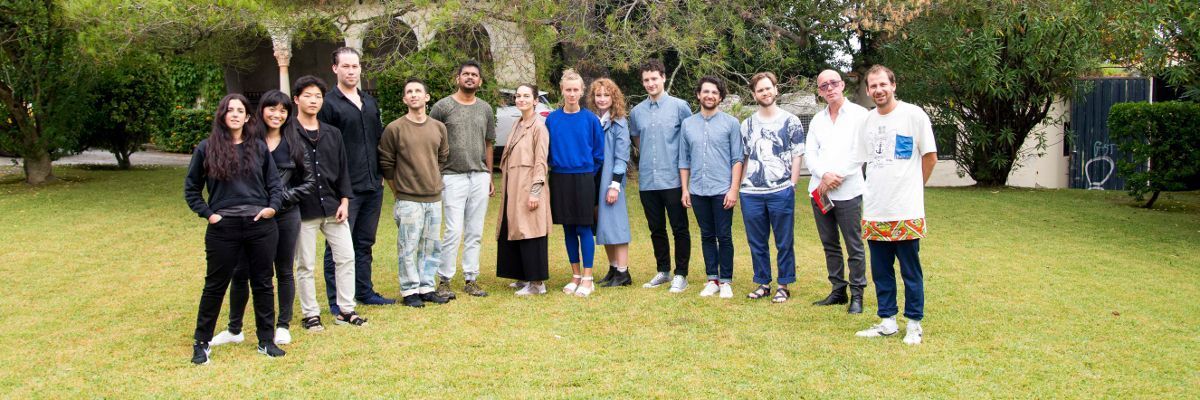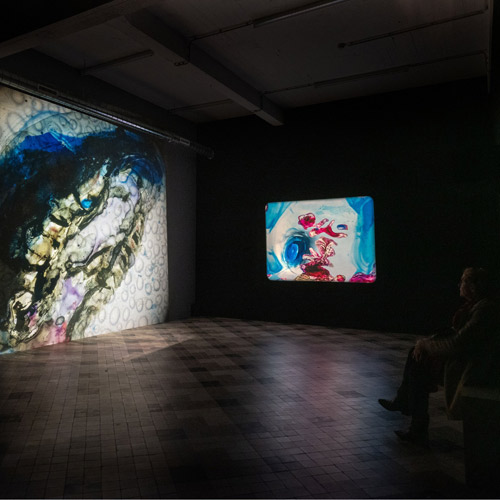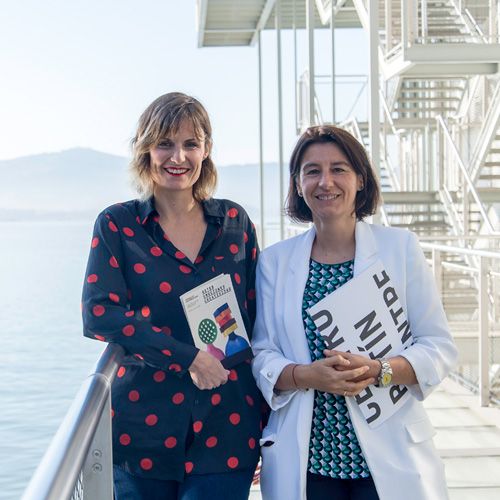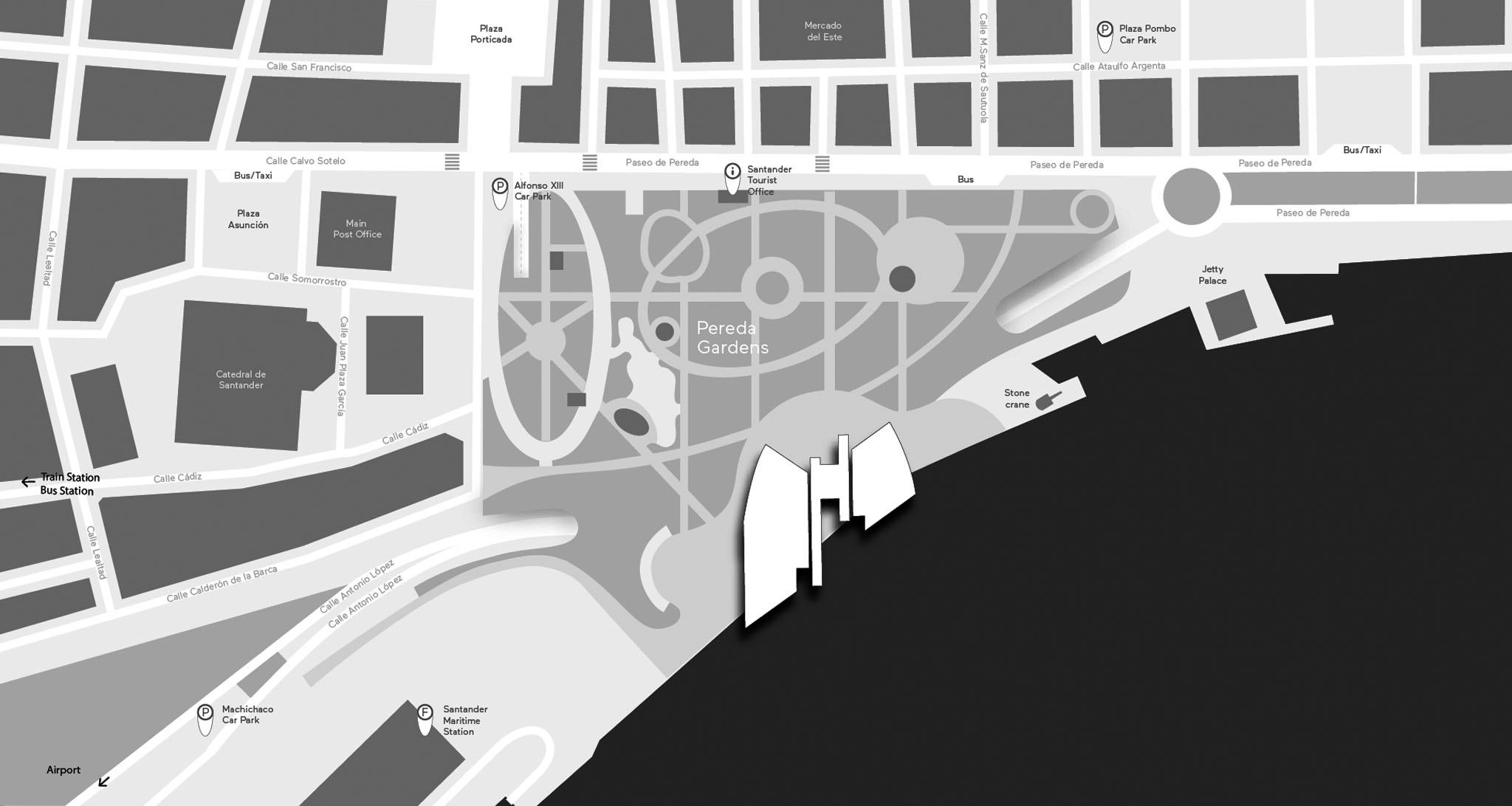
Carsten Höller arrives in Santander to lead the Villa Iris Visual Arts Workshop
- Since Monday, the 13 international artists chosen by the Belgian-born German artist have been working on their artistic proposals with Stefanie Hessler, co-director of the Workshop.
- The ten-day Workshop is aimed at developing artistic proposals in connection with the concept and role of games, an important and recurring theme in Höller’s work.
- The Workshop will close on Wednesday 13 September, at an event from 7.30 pm to 9.00 pm, where participants will have the opportunity to share their experiences and work with the audience.
Santander, 6 September 2017.- The Villa Iris Visual Arts Workshop was presented this morning. For 24 years, Fundación Botín has been organising this event, bringing young artists to Santander to work closely with outstanding creators such as Juan Uslé, Gabriel Orozco, Julião Sarmento, Miroslaw Balka, Antoni Muntadas, Jannis Kounellis, Mona Hatoum, Paul Graham, Tacita Dean, Carlos Garaicoa, Julie Mehretu and Joan Jonas.
Led by Carsten Höller and curator Stefanie Hessler, 13 artists from Spain, India, US, Colombia, Italy, Canada, South Korea, Denmark and Germany are taking part in this edition of the Workshop, which runs from 4 to 13 September. This unique experimental initiative is aimed at testing out games and experiments among the participants, who each day receive instructions to invent their own games without using materials. The practice intends to make them independently devise rules, social relationships and group dynamics.
Games are an important and recurring theme in Höller’s work, since in 1998 he published a collection of games titled “Spiele Buch”, edited by curator Hans-Ulrich Obrist. The book contains 135 games, each more surreal than the next. All can be played without the use of any tools. Some games are played alone, others require more than one player. In some cases, the players do not even realise their involvement in the game. Based on this book, the Workshop’s aim is to join Carsten Höller in creating a series of new games and experiments that can be played without using materials, in which the creative thought processes of participants play a pivotal role in their success.
Carsten Höller points out that the book he published 19 years ago is very short and was written in German, so the idea is to expand the collection of games during this Workshop, and publish a new volume in English. “I’ve just arrived and I haven’t yet met the participants, but I can’t wait. What we’re going to do is to document all the new games we devise in the Workshop, and see which ones are nicely suited to the new edition of the book we plan to publish. They will be peculiar, unusual and surreal games. We’re not used to this kind of game at all. In fact, some are games that cannot even be played. Some are reminiscent of the games created by André Breton or Paul Éluard, and we will actually use their games as inspiration in our workshop”, the artist explained.
The Workshop will also offer participants the chance to visit Carsten Höller’s exhibition, which has been on show at the Botín Centre since 23 June, and to watch its dismantling process once the exhibition closes on 10 September.
Fundación Botín’s Villa Iris Visual Arts Workshop is scheduled to close at an event from 7.30 pm to 9.00 pm on Wednesday 13 September, in which both the director of the Workshop and its participants will share their experience and the result of their work with the audience. Höller says, “we don’t yet know what we’re going to do. It will be a combination of exhibition and performance”.
During his press briefing, Höller explained thatthere is a marked contrast between the materiality of his “Y” exhibition at the Botín Centre and this Workshop, which is devoid of all materiality. “There are two works that are invisible and that most visitors overlook, but the rest of the works have considerable presence. Meanwhile, in the Workshop there is an acceptance of non-materiality that contrasts with the visible materiality of the works belonging to the exhibition”, Höller clarified, adding that “this is also linked to materiality, to what an artist creates, and it is something we shouldn’t be so constrained to, especially to that idea that an artist’s work must be strictly material. Hence, in ‘Y’ we might say the works are unfinished; they must be experienced. This is unsaturated art that implies visitors’ involvement and their interaction with the works”.
The 13 artists taking part in the Workshop are: Yusef Audeh (Sarasota, Florida, US. 1989), Felipe Castelblanco (Bogotá, Colombia. 1985), Roberto Fassone (Savigliano, Italy. 1980), Nieves de la Fuente Gutiérrez (Madrid, Spain. 1988), Kevin Gallagher (Chicago, US. 1986), Nicolas Grenier (Montreal, Canada. 1982), Lisa Hoffmann (Schleme, Germany. 1991), Junghun Kim (Jeju Island, South Korea. 1991), Miriam Kongstad (Denmark. 1991), Björn Kühn (Ludwigshefem, Germany. 1987), Paribartana Mohanty (Khudha, India. 1982), Risa Puno (Rigdewood, New Jersey, US. 1981), Marijana Radovic (Germany. 1984).
About Carsten Höller
Höller is a renowned Belgian-born German artist who makes use of his scientific background in his artistic works, focusing on the nature of human relations. He was born in Brussels in 1961 and currently lives and works between Stockholm and Biriwa (Ghana).
Some of his most important installations include Test Site, a series of giant slides created for the Turbine Hall at Tate Modern (2006); Amusement Park, full-sized amusement park rides that move at extremely slow speeds at MASS MoCA, North Adams, USA (2006); Flying Machine (1996), a work that lifted spectators into the air; Upside-Down Goggles (2001), an experiment with goggles that alter one’s vision; and the famous The Double Club (2008-2009), which opened in November 2008 in London and operated as a bar, restaurant, and party room until it closed in 2009, all with the aim of establishing a dialogue between Congolese and western culture. His Revolving Hotel Room (2008) is a rotating artistic installation which became a fully functioning hotel room at night. It was part of “theanyspacewhatever” exhibition held in 2009 at the Guggenheim Museum in New York. For the 2015 Decision exhibition at Hayward Gallery, he transformed the entire building into an experimental tour with two entrances and four exits, two of which were slides.
In the last two decades, Carsten Höller has undertaken numerous international exhibitions: Fondazione Prada, Milan (2000); ICA, Boston (2003); Musée d’Art Contemporain, Marseille (2004); Kunsthaus Bregenz, Austria (2008); Museum Boijmans Van Beuningen, Rotterdam (2010); Hamburger Bahnhof – Museum für Gegenwart, Berlin (2011); New Museum, New York (2011); Thyssen-Bornemisza Art Contemporary (TBA21), Vienna (2014); Pirelli HangarBicocca, Milan (2016); and most recently Henie Onstad Sanatorium in Henie Onstad Kunstsenter, Oslo.
About Stefanie Hessler
Hessler is a curator and writer based in Stockholm and Vienna. She co-founded the Andquestionmark art space in Stockholm together with Höller.
Some of her most recent curatorial projects include Tidalectics in TBA21–Augarten, Vienna (2017); Sugar and Speed in Museu do Arte Moderna de Recife, Brazil (2017); Winter Event – antifreeze in the Chilean National Museum of Fine Arts, Santiago de Chile; Flora in Bogotá (2015/16); 8th Momentum Biennial in Moss, Norway (2015); and Outside at Index, with the projection of a film at the Moderna Museet in Stockholm (2014).
Hessler frequently collaborates with art magazines such as ArtReview and Mousse Magazine, and has co-edited books such as Life Itself for the Moderna Museet (with Höller, Daniel Birnbaum and Jo Widoff).
…………………………………………
Fundación Botín
Fundación Marcelino Botín was created in 1964 by Marcelino Botín Sanz de Sautuola and his wife, Carmen Yllera, to promote social development in Cantabria. Today, fifty years later, Fundación Botín contributes to the overall development of society by exploring new ways of uncovering creative talent and supporting it to generate cultural, social and economic wealth. It organises programmes in the realms of the arts and culture, education, science and rural development, and supports social institutions in Cantabria so as to reach those who need it the most. Though Fundación Botín primarily focuses its action in Spain and particularly in Cantabria, it also reaches out to Latin America. www.fundacionbotin.org



